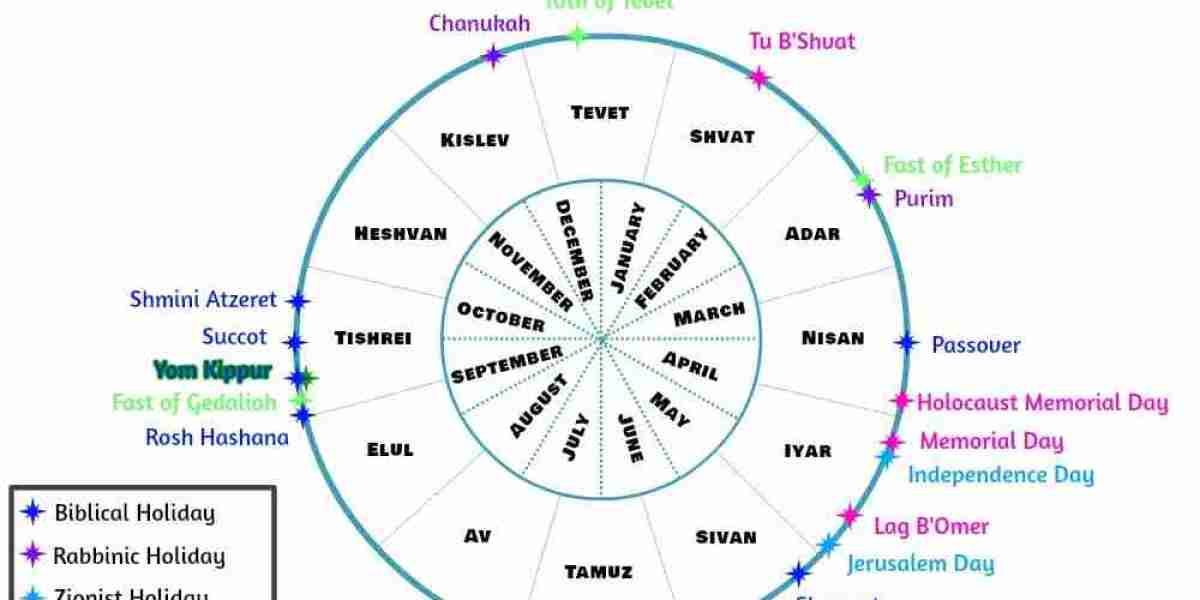Judaism is deeply rooted in time, memory, and sacred rhythms. Jewish holidays are not merely commemorations of past events; they are living traditions that connect generations through faith, reflection, and celebration. The Jewish calendar, which follows a lunar-solar system, is rich with festivals, fasts, and holy days—each carrying its unique spiritual essence. As 2025 approaches, it brings with it a full cycle of these profound occasions, from joyous celebrations like Purim and Hanukkah to solemn observances such as Yom Kippur and Tisha B’Av.
In this comprehensive guide, we explore all the Jewish holidays in 2025, their meanings, customs, and the ways they continue to shape Jewish life around the world.
Understanding the Jewish Calendar
The Jewish calendar is based on lunar months, with adjustments to align with the solar year, ensuring that holidays remain in their proper seasons. Each month begins with the new moon, and an extra month—Adar II—is added during leap years to keep Passover in spring. The Jewish year 5785 corresponds to 2024–2025 in the Gregorian calendar.
This cyclical nature makes every Jewish holiday a moment of renewal, inviting participants to relive historical events and spiritual truths.
Major Jewish Holidays in 2025
Below is a detailed overview of the major Jewish holidays in 2025, their significance, and observance dates.
Tu BiShvat – The New Year for Trees
- Date in 2025: February 12, 2025 (15 Shevat 5785)
Tu BiShvat, often called the Jewish Earth Day, celebrates nature and renewal. It’s a time to plant trees, enjoy fruits from the Land of Israel, and express gratitude for the environment. Many Jews hold a Tu BiShvat Seder, featuring fruits, nuts, and readings about creation and stewardship.
Purim – The Festival of Joy
- Date in 2025: March 14–15, 2025 (13–14 Adar 5785)
Purim commemorates the salvation of the Jewish people in ancient Persia as recorded in the Book of Esther. Customs include reading the Megillah (Book of Esther), wearing costumes, giving charity (matanot la’evyonim), and exchanging gifts of food (mishloach manot).
Purim is one of the most joyful holidays, characterized by laughter, plays, and community spirit.
Passover (Pesach) – The Festival of Freedom
- Date in 2025: April 12–20, 2025 (15–22 Nisan 5785)
Passover marks the Exodus from Egypt and the liberation of the Israelites from slavery. The holiday begins with the Seder, a ritual meal with symbolic foods like matzah (unleavened bread), bitter herbs, and wine.
Throughout the week, Jews refrain from eating chametz (leavened products) and focus on themes of freedom, faith, and redemption.
Passover is a time when families gather, retell their story of liberation, and reflect on personal and collective freedom.
Yom HaShoah – Holocaust Remembrance Day
- Date in 2025: April 28, 2025 (27 Nisan 5785)
Yom HaShoah is dedicated to remembering the six million Jews who perished in the Holocaust. It’s a solemn day marked by memorial ceremonies, candle lighting, and moments of silence. In Israel, a siren sounds throughout the country, and people stand still in remembrance.
Yom HaZikaron – Memorial Day for Israel’s Fallen Soldiers
- Date in 2025: May 5, 2025 (5 Iyar 5785)
This day honors the memory of those who gave their lives defending Israel. It is observed with ceremonies at military cemeteries, public memorials, and national broadcasts. The mood is reflective, preparing for the celebration of independence that follows.
Yom HaAtzmaut – Israel Independence Day
- Date in 2025: May 6, 2025 (6 Iyar 5785)
Immediately following Yom HaZikaron, Israel bursts into celebration for Yom HaAtzmaut. Fireworks, music, and festive meals fill the night skies as Israelis mark the founding of the State of Israel in 1948.
Lag BaOmer – Celebration of Jewish Mysticism
- Date in 2025: May 22, 2025 (18 Iyar 5785)
Lag BaOmer commemorates the end of a historical plague among Rabbi Akiva’s students and honors the memory of Rabbi Shimon bar Yochai, a mystic and scholar. Bonfires, picnics, and weddings are traditional on this day.
Shavuot – The Giving of the Torah
- Date in 2025: June 1–2, 2025 (6–7 Sivan 5785)
Shavuot celebrates the giving of the Torah at Mount Sinai. It’s customary to stay up all night studying Torah, decorate homes with greenery, and enjoy dairy foods like cheesecake and blintzes.
Spiritually, it’s a day of recommitting to Jewish values and learning.
Fast of Tammuz
- Date in 2025: July 13, 2025 (17 Tammuz 5785)
This fast day commemorates the breach of Jerusalem’s walls before the destruction of the Second Temple. It begins a three-week mourning period leading to Tisha B’Av.
Tisha B’Av – Mourning the Destruction of the Temples
- Date in 2025: August 3–4, 2025 (9 Av 5785)
Tisha B’Av is the saddest day on the Jewish calendar, marking the destruction of both the First and Second Temples in Jerusalem. Jews fast, read the Book of Lamentations (Eicha), and reflect on exile and loss.
The day serves as a reminder of the resilience and hope that have carried the Jewish people through centuries.
Rosh Hashanah – The Jewish New Year
- Date in 2025: September 22–24, 2025 (1–2 Tishrei 5786)
Rosh Hashanah ushers in the new year with introspection and prayer. The shofar (ram’s horn) is blown to awaken the spirit to repentance and renewal. Traditional foods like apples dipped in honey symbolize hopes for a sweet year.
Rosh Hashanah emphasizes gratitude, forgiveness, and the potential for spiritual rebirth.
Yom Kippur – The Day of Atonement
- Date in 2025: October 1–2, 2025 (10 Tishrei 5786)
Yom Kippur is the holiest day in Judaism. It’s observed through fasting, prayer, and repentance. Jews spend the day in synagogue, seeking forgiveness from God and reconciling with others.
As the final shofar blast marks the end of Yom Kippur, many feel a profound sense of renewal and peace.
Sukkot – The Feast of Booths
- Date in 2025: October 6–12, 2025 (15–21 Tishrei 5786)
Sukkot celebrates the Israelites’ journey through the desert after leaving Egypt. Families build temporary huts (sukkot) decorated with fruits and greenery, where they eat and sometimes sleep.
It’s a week of joy, community, and gratitude for nature’s bounty.
Shemini Atzeret and Simchat Torah
- Date in 2025: October 13–14, 2025 (22–23 Tishrei 5786)
Shemini Atzeret marks the conclusion of Sukkot and a prayer for rain in Israel. The following day, Simchat Torah, celebrates the completion and restarting of the annual Torah reading cycle.
Joyous dancing with Torah scrolls fills synagogues worldwide, symbolizing love for learning and divine wisdom.
Hanukkah – The Festival of Lights
- Date in 2025: December 15–23, 2025 (25 Kislev–2 Tevet 5786)
Hanukkah commemorates the Maccabean victory over the Greeks and the rededication of the Holy Temple. For eight nights, Jews light the menorah, adding one candle each night. Traditional foods include latkes (potato pancakes) and sufganiyot (jelly donuts).
Hanukkah celebrates perseverance, faith, and the miracle of light in dark times.
Minor Jewish Observances and Fast Days in 2025
- Fast of Esther: March 13, 2025
- Rosh Chodesh (New Moon) – Monthly celebrations marking the new Hebrew month.
- Shabbat (Sabbath): Every Friday evening to Saturday evening – a weekly day of rest and holiness.
These observances add texture and continuity to the Jewish year, reinforcing spiritual mindfulness in daily life.
The Spiritual Meaning Behind Jewish Holidays
Each Jewish holiday has layers of meaning—historical, agricultural, and spiritual. Together, they tell the story of a people’s faith, survival, and relationship with God.
- Passover reminds us of liberation and gratitude.
- Rosh Hashanah and Yom Kippur call for repentance and renewal.
- Sukkot and Shavuot emphasize connection with nature and divine revelation.
- Hanukkah and Purim celebrate miracles and courage.
These cycles reflect Judaism’s message: life is sacred, time is holy, and every season holds an opportunity for growth.
Celebrating Jewish Holidays in Jerusalem
There’s no place on earth where Jewish holidays feel as vibrant and alive as in Jerusalem. The ancient city resonates with history and spirituality. On Shabbat evenings, streets quiet down; during Sukkot, the city’s balconies transform into leafy booths; on Yom Kippur, traffic ceases and the entire city becomes a sanctuary.
From the Western Wall to local synagogues and homes, the sense of shared faith and community is profound. Visitors often describe celebrating in Jerusalem as a life-changing experience.
A Perfect Stay for Holiday Travelers – Paamonim Hotel Jerusalem
Located in the heart of the city, Paamonim Hotel Jerusalem offers travelers an ideal base for experiencing the beauty and sanctity of Jewish holidays. Situated near the Old City and key religious landmarks, the hotel provides a welcoming atmosphere with modern comfort and traditional charm.
During festive seasons like Passover, Sukkot, and Hanukkah, Paamonim Hotel creates a warm, family-friendly environment with kosher meals, easy access to synagogues, and stunning city views. Guests can walk to the Western Wall or explore nearby markets and cultural attractions. Whether you’re visiting Jerusalem for spiritual renewal or cultural exploration, Paamonim Hotel ensures your stay is peaceful, meaningful, and unforgettable.
Jewish Holiday Food Traditions
Food is an essential part of every Jewish holiday, each dish symbolizing faith, memory, or gratitude.
- Passover: Matzah, charoset, and roasted lamb shank.
- Shavuot: Dairy dishes like cheesecake and blintzes.
- Rosh Hashanah: Apples and honey for a sweet year.
- Hanukkah: Fried foods to commemorate the oil miracle.
- Purim: Hamantaschen pastries filled with fruit or poppy seeds.
Each meal serves as a spiritual experience, turning dining into a sacred ritual of remembrance and joy.
Jewish Holidays Around the World
Jewish communities across the globe bring their unique flavors and traditions to these holidays.
- In Israel, public celebrations fill the streets during Sukkot and Independence Day.
- In the United States, synagogues host community seders and menorah lightings.
- In Europe, centuries-old customs blend with modern expressions of faith.
- In South America and Africa, vibrant Jewish communities keep ancient traditions alive through song, dance, and family gatherings.
Despite differences in geography, every celebration shares a common purpose—connection to heritage and hope.
The Modern Meaning of Jewish Holidays in 2025
In 2025, Jewish holidays continue to offer deep relevance. Amid global change, these observances ground individuals and communities in timeless values—faith, resilience, compassion, and gratitude. Technology may connect people across continents, but holidays unite hearts through shared memory and ritual.
Whether one celebrates in Jerusalem, New York, or Cape Town, the message remains: the Jewish spirit endures, and every festival renews its light.
Conclusion
The Jewish holidays of 2025 form a sacred tapestry woven through time, reflecting thousands of years of faith and continuity. From the solemn tones of Yom Kippur to the joyful songs of Hanukkah, each day invites Jews—and all who join them—to experience renewal, gratitude, and community.
As we step into 2025, these holidays remind us to slow down, reflect on our blessings, and embrace the rhythms that make life holy. And for those seeking to celebrate in the heart of the Jewish world, Paamonim Hotel Jerusalem stands ready to offer comfort, hospitality, and proximity to the city’s spiritual soul.
Through every prayer, candle, and song, the Jewish calendar continues to light the way forward—illuminating the timeless connection between people, history, and the divine.





